For those of us who have been using our computers, smartphones and tablets solely for the purposes of entertainment, it’s time for an important realization: your digital device can be your ultimate tool for growth and self-education.
Public libraries are also a huge source of knowledge. You can choose any printed or online material you find enjoyable and use your weekends for self-development.
Needless to say, independent learning (and independent thinking!) is a journey that requires great commitment.
It's not easy to become an autodidact (or self-taught person). The online world is full of distractions, so you need to remind yourself of your purpose and work a lot on your discipline.
So if you're interested in enhancing your self-education efforts, then we recommend 20 habits that will help you master any topic, skill, or important concept.
Let's get to it…
1. Prepare a studying environment.
Since you don’t have a classroom to keep you as focused as possible, you have to create your own studying space (you can learn how to do it from this Edutopia article). It’s important to organize a desk for that purpose.
Get a comfortable chair, a laptop, the books and notebooks you need, and some pens/pencils/markers. As soon as you sit on that chair, your mind will be prepared to commit to the goal of education and learning.
And if you're a student, then it's important to set up a study environment and schedule that's free from distraction. On our blog, Niklas Goeke provides a step-by-step process on how to create a study schedule that works.
2. Get a dictionary.
Of course, you can also use an online dictionary like Merriam-Webster or Dictionary.com, but you also need a printed dictionary that you’ll use when you’re studying from books.
Studies, textbooks and other important materials are often written in a highly intellectual language, so you’ll need interpretations to understand what the authors are trying to say.
As a rule of thumb, whenever you don't know a word, spend a few minutes to look it up. Then challenge yourself to use this new word in a conversation in the next 24 hours.
You can even take it to the next level by creating a “word-of-the-day” 30-day challenge.
3. Highlight important pieces of information.
You have to highlight every important concept that you come across. You can do this in a variety of ways:
- Use neon highlighters for physical books that you own
- Take notes in a specialized journal or notebook (Here are our 7 favorites.)
- Use the highlight and bookmark feature on your favorite eReader.
- Download and use a note-taking app on your phone.
- Record your notes in a digital storing device like Evernote.
The human brain isn't designed to remember every piece of information you come across. So if you feel a piece of information is important, then take the time to record it in a system that you can refer to sometime in the future.
To learn more about retaining information, read our article on the Learning Retention Pyramid.
4. Learn from different mediums.
Read relevant articles, journals and books, attend seminars, watch TV documentaries, and get college/university textbooks from the niche of your interests.
You can even listen to educational podcasts and watch YouTube videos about this topic, which are usually free.
If you're a big fan of learning through watching documentaries, read our review of CuriosityStream to see if it's for you.
If you're attending university, check out these SMART goal examples for college students to help you set the right learning goals.
Discover which podcast suites your learning style. Check out our lists of favorite podcasts:
In a recent article, we talked about the 7 styles of learning, which includes visual, social, solitary, logical, physical, verbal, and aural.
The point of this article is we all have a unique combination of “what works” for our self-education efforts. So the trick is to understand how you learn and then build a system around it.
So experiment with different mediums and focus on the one that inspires you the most. However, don’t limit yourself to a single source of knowledge; make sure to experiment and benefit from information in all forms.
And if you'd like to use a platform that combines a variety of these styles of learning, then I recommend checking out these platforms:
- Skillshare (You can read the review of it here.)
- Udemy (You can read the review of it here.)
- Coursera (You can read the review of it here.)
5. Follow up on the references.
When you’re reading serious materials, you’ll find references from books, scientific articles, statistical sources, and other types of publications that helped the author support the facts.
Find those materials and you’ll gain a whole new dimension of the topic you’re focused on.
6. Talk to experts.
You can learn a lot from meaningful conversations. Find people who are experts on the topics of your interests and ask questions. Nothing beats one-to-one communication with inspiring people.
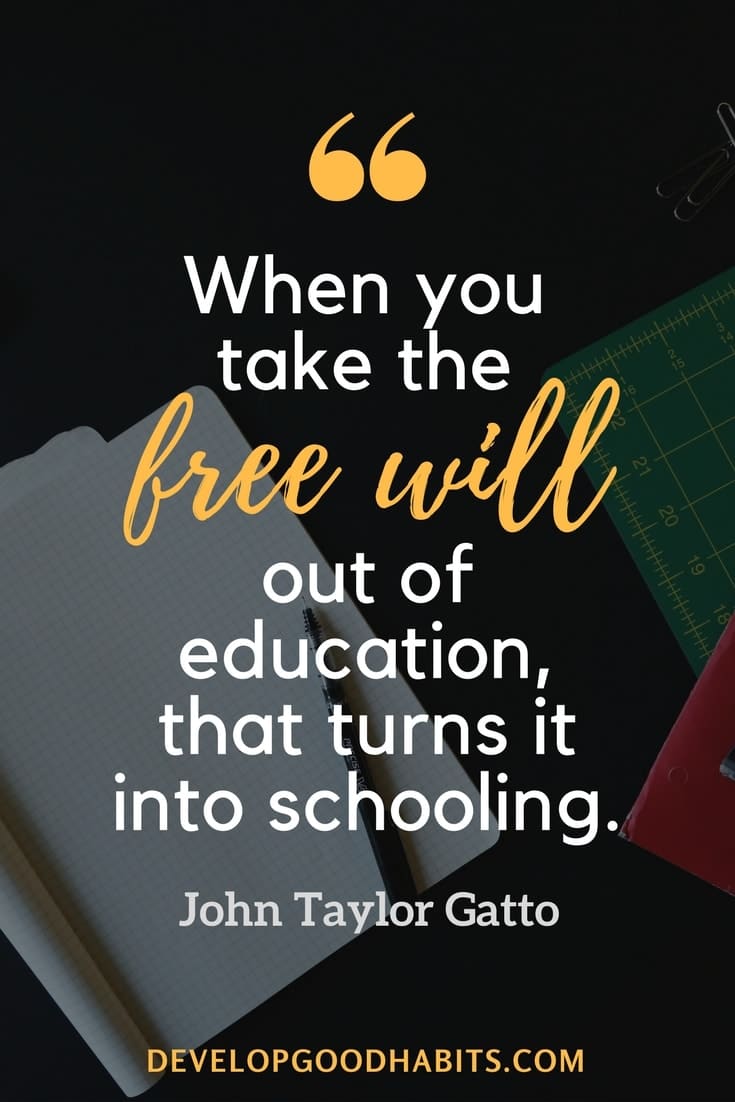
In fact, if you'd like to truly master topic, find a mentor and find a way to get this person to guide you through the process.
7. Study every day!
It’s better to study for half an hour every single day than to binge study for an entire weekend and then forget about your goal for the next several days (for example, this story written by Rachen Bryan explains why binge studying can be bad for your health).
Routine is important! Organize your learning schedule in short, frequent sessions that will keep you focused on the material. Check out Steve's steps to an effective study routine
8. Don’t assume everything you read is true.
Even when you find the most relevant sources to study from, you can never assume the things you read are 100% true.
When you use different studying materials, some of them may be in contradiction to the things you already know. Make sure to get to the bottom of the issue by conducting an in-depth research.
To learn more, watch this brief video about how to do simple fact-checking on the information that you are consuming:
9. Join online communities of learners and methods.
Brilliant minds attract each other. You don’t want to study in isolation, so make sure to find the right Facebook groups, sub-reddit communities, and LinkedIn groups that will connect you to people you can learn from.
The key here is to go quality over quantity. It's better to find that one group full of knowledgeable people, instead of joining dozens of groups, filled with individuals who only focus on low-quality information. So I would recommend taking a few weeks to check out different groups until you find that one or two that is filled with actual experts on the topic.
10. Make learning your lifestyle.
As you gain more knowledge and you start understanding how things work, you might lose your ability to wonder. Don’t allow that to happen! Ask more questions and discover new things every single day.
You can do this in a variety of ways:
- Challenge yourself to read on a daily basis.
- Write down any interesting idea or piece of information that you come across
- Listen to podcasts as you drive, exercise, do chores, and run errands. You can easily consume hours of information-packed content just by building this one simple habit.
- Do a deep-dive of any topic by subscribing to and watching videos on YouTube.
- Make it a point to learn one new thing or get 1% better at a skill every single day. (For more on this, check out our article about the Kaizen concept.)
- Use an educational app to supplement learning.
If you're struggling to learn, watch the video below to explore 10 of the most powerful mind tricks you can use to learn anything fast. With just a few simple tweaks to your learning approach, you'll be able to pick up new skills in no time.
11. Search for online courses.
Many reputable universities are offering free online courses on websites like Udemy, Coursera, edX, SkillShare, and other popular websites. If you want to be different from the crowd of online learners, you might want to try unexpected sources of knowledge.
There are plenty of online destinations that allow you to gain the knowledge you need, but again, here are our favorite platforms:
- Skillshare (You can read the review of it here.)
- Udemy (You can read the review of it here.)
- Coursera (You can read the review of it here.)
- Masterclass (You can read the review of it here.)
12. Get information from news aggregators.
Instead of checking different websites, you can stay updated with the trends if you follow news aggregators like Fark, Google News and Feedly.
Don't simply join the bandwagon when it comes to learning about new subjects though. Make sure to read information from reliable and varied sources.
13. Don’t just read. Review!
Make sure to make a summary of the things you’ve learned that day. Take notes and review them once you finish the learning session.
This practice will help you to absorb the material much more easily.
14. Set goals.
It’s important to develop a habit of learning. That’s why you need to set monthly and daily goals, and give yourself a motivation to accomplish them.
If you'd like to discover additional information on setting self-education goals, then I suggest you check out the following articles:
- The Difference Between Process and Outcome Goals
- 27 Examples of Short-Term Goals
- 25 Examples of Long-Term Goals
- 30 Affirmations for Achieving Goals
- A TED Talk by Tim Ferriss on Why “Fear Setting” is More Important Than Goal Setting
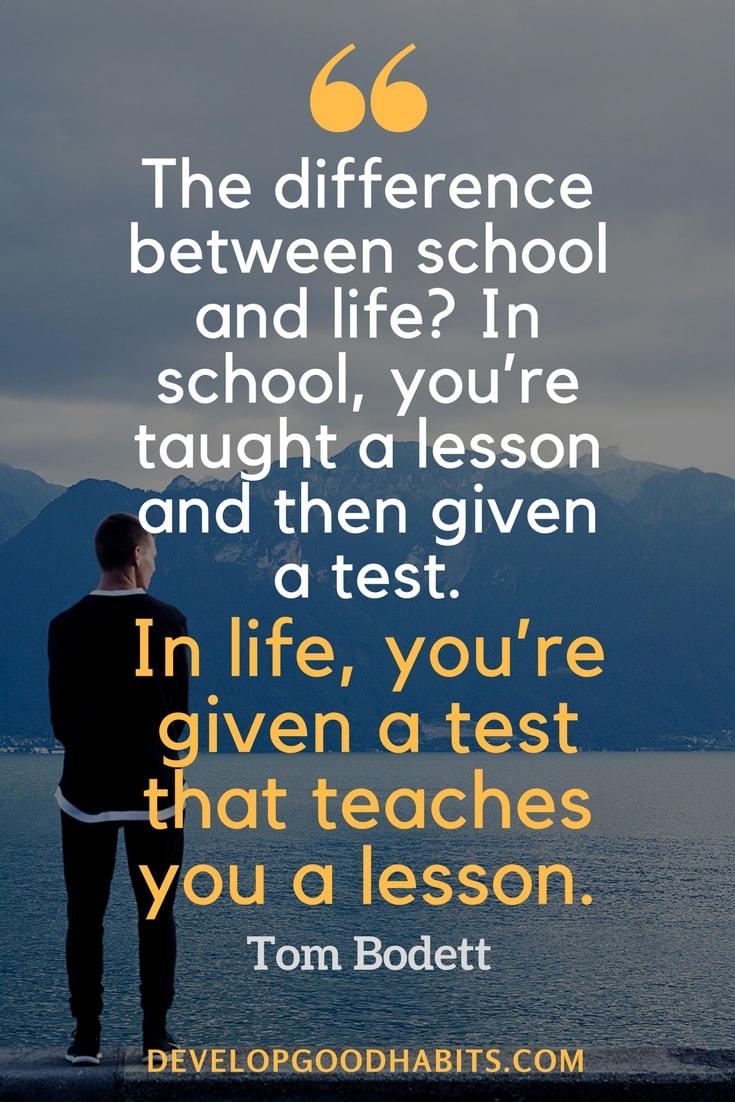
15. Write essays and research papers!
Do you know what can inspire you to learn more? Writing! Pick a great topic and write a detailed essay or research paper on it.
Publish these papers on your own blog and get into discussions with the community of followers you attract. If you don't believe writing can help, read about its psychological benefits here.
16. Teach!
If you want a proof that you’ve gained enough knowledge – start teaching. You can become a private tutor, or offer an online courses or even write a book about the subject. (Learn how set SMART goals for teachers in this post.)
There are awesome free course authoring tools you can use to help other people learn the things you know. And if you'd like to learn how you can become an author by publishing your thoughts, here is a 17-step process on generating an income as a self-published author.
17. Have a schedule.
Self-education should be a commitment, not a pastime. Make sure to fit it in your schedule as a regular activity with deadlines and responsibilities.
A famous quote (that is often attributed to Aristotle) is:
“We are what we repeatedly do. Excellence, then, is not an act, but a habit.”
My point?
If you'd like to master any skill or topic, then you should work at it… Every. Single. Day. In fact, include it as a task on your favorite to-do list tool and make sure it's an important part of your schedule.
18. Take notes.
You need to maintain a journal that will remind you of everything you love about learning. Write about all realizations and goals!
You can use Penzu or another online journal that will keep your notes private, or play with other methods of digitizing your study notes.
You can use the Feynman technique to learn everything about a single topic.
19. Every obstacle is a chance to expand.
You’ll face disappointment, discouragement, confusion and lack of inspiration. If you make an effort to surpass all these obstacles, you’ll grow into the committed person you always wanted to be.
20. Say YES to new experiences.
Since you have the liberty to develop your own learning style, you have to infuse some practical experience into this journey.
Write a blog, teach other people, or find a way to implement everything you learn into your traditional education or the job you have.
Final Thoughts on Self-Education
The human mind has a huge power that not all people understand. Most of us are happy enough with the education we get at school, but we can achieve much greater heights when we get out of those boundaries.
Since all resources are out there, there is no reason to delay your journey through self-education any longer. You can learn anything today using available technology. And if you need some visual inspiration, here are some of our favorite vision board ideas for students.
Hopefully the 20 habits that I listed in this article will help you take that first step to mastering any skill or piece of information you're trying to learn.
If you want to learn more, check out our post on the benefits of virtual learning. Or if you're looking for more practice advice, check out our post on Adulting 101.
If you're looking for inspiration, then read about famous autodidacts or self-taught people here.
About the Author: Julie Petersen is a content marketing specialist and a private language tutor. At present time she is running her essay writing blog AskPetersen.com. Find out more about Julie here.

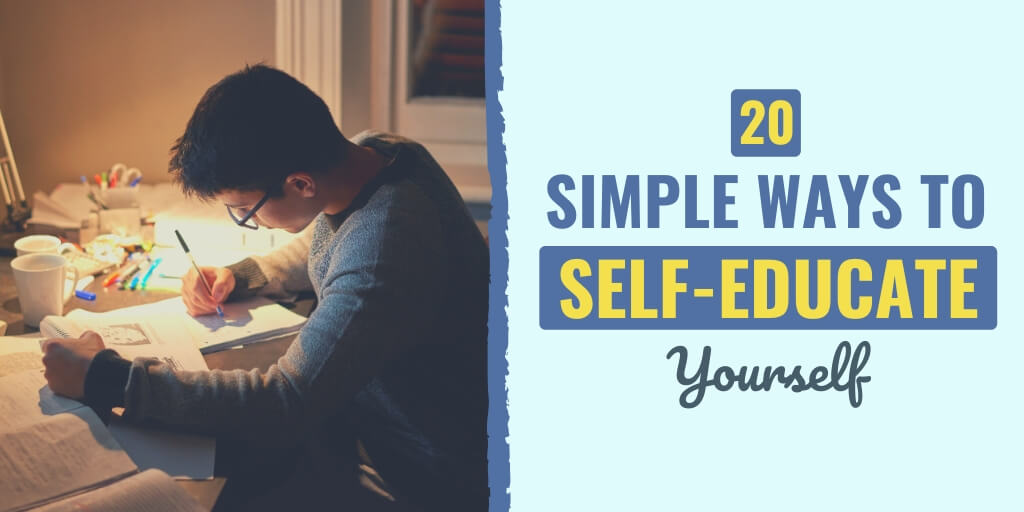
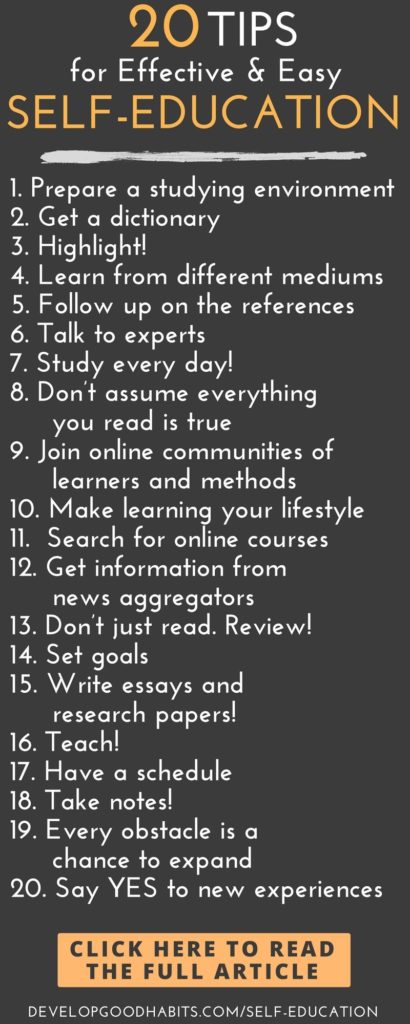
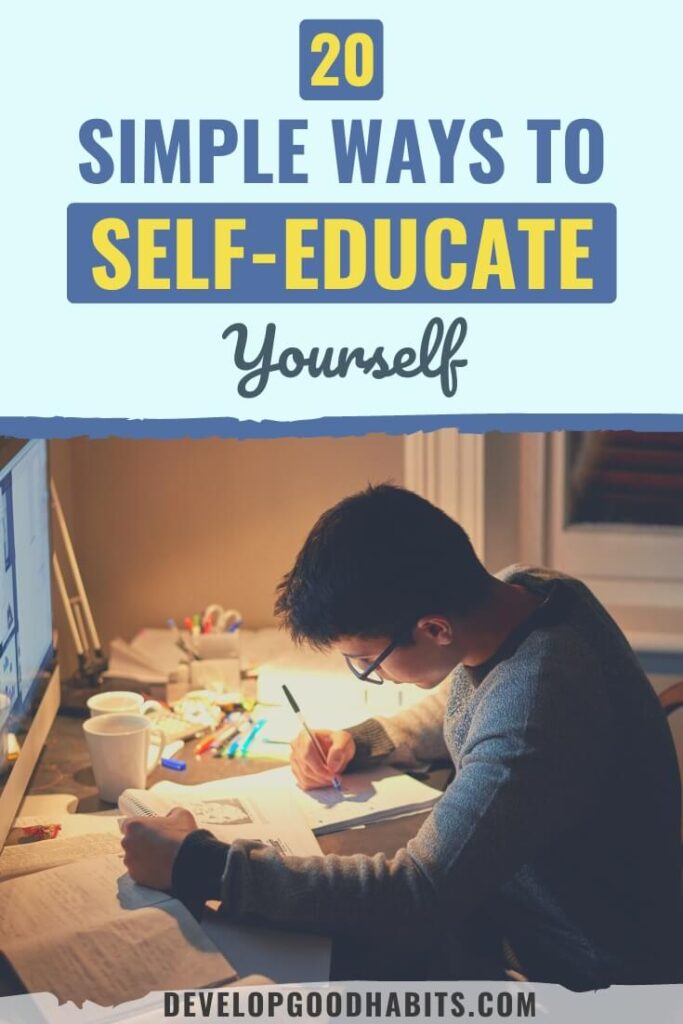
Great post! I definitely need to take these steps when learning new information for my job at TimeTap. I especially like that you pointed out teaching as a way to learn. Sometimes I think the only thing that got me through organic chemistry in college was working with a study group and teach sections to other students.
Thanks,
Shawn
Really good list. I love self education. It just makes things easier. One thing I would add to the list is to do the thing you’re trying to learn. When I started in Wealth Management as a Jr Advisor, I did a lot of the things but I spent my free time creating financial portfolios.
By the time I got in front of clients, they thought I had been doing the job for years even though I was only a few months in. Great blog you have here.
Thanks for writing such a helpful post. In my past year of research, I found that numbers 6, 8 and 9 above were especially true.
Reaching out to trained & certified experts to validate assumptions was key to drafting version 1.0 of some meaningful solutions & tools for our community of People with Type 2 Diabetes.
Scouring many articles to understand the counterpoints to common points has been important, too. It does not help folks to just jump on the trending bandwagon. More important is to confirm what is safe and sustainable for the long term.
And, of course, the community aspect is where you find the real Gold. Reading solo got me only 20% of the way there… but learning from the online community & participating in debates and conversations continues to be tremendously helpful.
I’m emphasizing these points to our community members.
And… by the way… your 30 day habit challenges are really well designed. Most folks just have 1 or 2. I love it that you have a full portfolio that addresses our common daily issues.
Cheers! Ed
Awesome post. I do a lot of research on the brain and nootropics (supplements that improve brain health), which have some useful opportunities for self-education. I’ll stick to the habits specifically as I know that’s what you focus on most:
Walking is a great way to increase learning and memory retention during self-education. A Stanford study showed a 50% bump in creativity from simply walking (see the study here: http://news.stanford.edu/2014/04/24/walking-vs-sitting-042414/ )
I’m a big proponent of frequent walks (10 minutes every 1 hour) and I’m a big believer it gives the mind and body a rest, but also makes it more effective at learning.
Mansal,
Thanks for sharing the standford study. It is a great one. I am a huge fan of walking, I walk or run every day and find it a great source of my creativity.(this backs up your study!) I also agree with you about frequent smaller walks… I also practice this and wrote a blog post about it once….
Thanks for a great comment with some awesome additional insight! Have a great day!
Good advice. When I entered the university, I had problems with academic writing. We studied this course, but there was too little material. For further study, I used the Internet. Now there are a lot of good online courses or articles on websites. Thanks to them, I quickly mastered the academic letter. But self-education requires a good skill of self-organization! Train this skill first.
I think it is important to always have questions in mind as you are studying. This way your studies can be purpose driven and meaningful to you which will help you remember it better. I’ll have to consider your study tips in the future.
A Hispanic surviving in the US who not learn to speak English
would experience an absence inside the quantity of jobs they are
eligible for. The Oakridge International can be located within the claim that provides best value education along with a world class school amenity
on the students. Of course, we forget that most those new gadgets and
technology stood a human designer behind
them.
Hi Wright kite,
This was a outstanding informative post you have shared on this page about the online courses because this Knowledge in a India’s leading training networking Platform to provides courses for students, working professionals job seekers and corporate employees with placement assured but but I have NOT taken every single one of these, so I cannot fully vouch for all of them. If you do take one and it’s full of smarmy or BS,you must check the material of your study is related and also helpful in your study ,other your waste your time and loss of money .
Thanks.
As I definitely agree that reading printed or online material can help a person go through self-development through self-education, I would like to suggest looking for online news sites to get information from. They can contain insightful tips such as how to avoid getting into a car accident and which new food stores have opened downtown. Reading the news every day can also inspire one to make a positive difference within one’s community in order to make everyone’s lives happier.